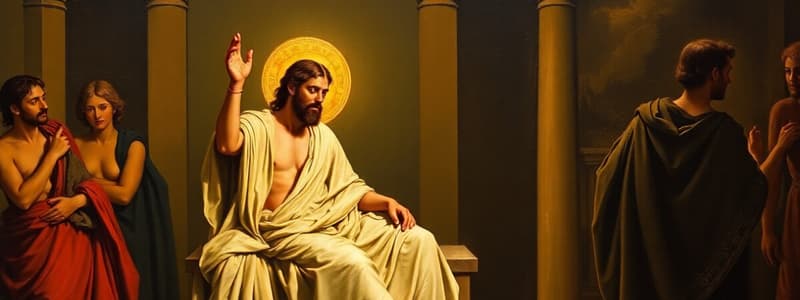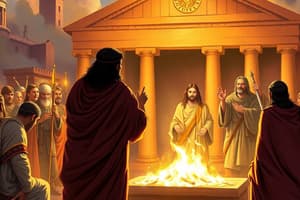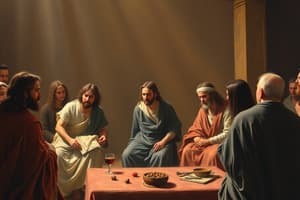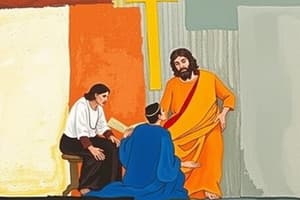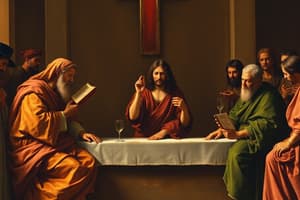Podcast
Questions and Answers
What was the purpose of the fortress called Antonia?
What was the purpose of the fortress called Antonia?
- It functioned as a religious temple.
- It served as a military training ground.
- It acted as a strategic military stronghold. (correct)
- It was primarily a royal residence for Herod.
What significant event occurred during the later years of Herod's reign?
What significant event occurred during the later years of Herod's reign?
- The Romans withdrew their legionnaires from Jerusalem.
- He built the Temple to replace Antonia.
- The golden eagle on the Temple roof was destroyed. (correct)
- Herod established a peace treaty with local scholars.
How did Joseph describe the Syrian auxiliaries stationed at the gates?
How did Joseph describe the Syrian auxiliaries stationed at the gates?
- As dangerous warriors.
- As skilled horsemen.
- As ineffective defenders. (correct)
- As highly trained archers.
What architectural feature of Antonia was specifically designed to thwart invasions?
What architectural feature of Antonia was specifically designed to thwart invasions?
What was noted about the layout of the fortress Antonia?
What was noted about the layout of the fortress Antonia?
What was Pilate's demeanor when he was first introduced in the scene?
What was Pilate's demeanor when he was first introduced in the scene?
What did Joseph provide Matthias to assist in his quest?
What did Joseph provide Matthias to assist in his quest?
How did Pilate respond to Matthias's desire to include the story of Jesus in his history?
How did Pilate respond to Matthias's desire to include the story of Jesus in his history?
What aspect of Pilate's character was contradicted by Matthias's prior research?
What aspect of Pilate's character was contradicted by Matthias's prior research?
What did Pilate question during his discussion with Matthias?
What did Pilate question during his discussion with Matthias?
What was Pilate's initial attitude towards Jesus and his activities?
What was Pilate's initial attitude towards Jesus and his activities?
Why did Pilate decide not to arrest Jesus during his entry into Jerusalem?
Why did Pilate decide not to arrest Jesus during his entry into Jerusalem?
What action did Jesus take in the Temple that caught Pilate's attention?
What action did Jesus take in the Temple that caught Pilate's attention?
What was Pilate's concern regarding the potential arrest of Jesus?
What was Pilate's concern regarding the potential arrest of Jesus?
What did Pilate imply about Caiaphas during his conversation?
What did Pilate imply about Caiaphas during his conversation?
What was Pilate's initial reaction to Caiaphas' request for soldiers to arrest Jesus?
What was Pilate's initial reaction to Caiaphas' request for soldiers to arrest Jesus?
Why did Pilate supply Caiaphas with a large number of troops for the arrest of Jesus?
Why did Pilate supply Caiaphas with a large number of troops for the arrest of Jesus?
What did Caiaphas believe was a reason for his guards' hesitation in arresting Jesus?
What did Caiaphas believe was a reason for his guards' hesitation in arresting Jesus?
What reason did Pilate give for eventually becoming involved in Jesus' trial?
What reason did Pilate give for eventually becoming involved in Jesus' trial?
Why did the Sanhedrin refuse to enter Pilate's hall with their prisoner?
Why did the Sanhedrin refuse to enter Pilate's hall with their prisoner?
What was Pilate's initial impression of the prisoner?
What was Pilate's initial impression of the prisoner?
What accusation did Caiaphas make against Jesus that was outside their own laws?
What accusation did Caiaphas make against Jesus that was outside their own laws?
Why did Pilate feel compelled to sit in judgment of Jesus?
Why did Pilate feel compelled to sit in judgment of Jesus?
What question did Pilate ask Jesus when they were alone?
What question did Pilate ask Jesus when they were alone?
How did Jesus respond to Pilate's question about him being the king?
How did Jesus respond to Pilate's question about him being the king?
What conclusion did Pilate come to about Jesus' danger level to Rome?
What conclusion did Pilate come to about Jesus' danger level to Rome?
What ultimately prevented Pilate from releasing Jesus after declaring him innocent?
What ultimately prevented Pilate from releasing Jesus after declaring him innocent?
What was Pilate's reaction to the accusations of blasphemy against Jesus?
What was Pilate's reaction to the accusations of blasphemy against Jesus?
What did Jesus convey to Pilate regarding the source of his power?
What did Jesus convey to Pilate regarding the source of his power?
What did Caiaphas claim was the reason for Jesus' execution under Jewish law?
What did Caiaphas claim was the reason for Jesus' execution under Jewish law?
How did the crowd respond when Pilate sought to release Jesus?
How did the crowd respond when Pilate sought to release Jesus?
What final act did Pilate perform before accepting the crowd's decision?
What final act did Pilate perform before accepting the crowd's decision?
Why did Pilate allow Herod to judge Jesus after hearing the accusations against him?
Why did Pilate allow Herod to judge Jesus after hearing the accusations against him?
What was the significance of the Day of Indulgence in relation to Pilate's duties?
What was the significance of the Day of Indulgence in relation to Pilate's duties?
What was Pilate's reasoning for scourging Jesus despite declaring him innocent?
What was Pilate's reasoning for scourging Jesus despite declaring him innocent?
How did Caiaphas influence the crowd's reaction to Pilate's decisions?
How did Caiaphas influence the crowd's reaction to Pilate's decisions?
What does Pilate's description of his soldiers and the 'Circle of Death' imply about Roman military practices?
What does Pilate's description of his soldiers and the 'Circle of Death' imply about Roman military practices?
What method was used to mock Jesus after his return from Herod?
What method was used to mock Jesus after his return from Herod?
What was the crowd's likely perception of Barabbas compared to Jesus?
What was the crowd's likely perception of Barabbas compared to Jesus?
How did Jesus respond to the accusations and ridicule at Herod's palace?
How did Jesus respond to the accusations and ridicule at Herod's palace?
What emotional state did Pilate exhibit when the crowd demanded Barabbas' release?
What emotional state did Pilate exhibit when the crowd demanded Barabbas' release?
What does Pilate's use of the term 'motley ruffians' suggest about the crowd?
What does Pilate's use of the term 'motley ruffians' suggest about the crowd?
Flashcards are hidden until you start studying
Study Notes
First Encounter with Pilate
- Matthias and Joseph arrive at the Roman military headquarters guarded by Syrian auxiliary soldiers.
- The fortress Antonia is described as a formidable structure with a dominant presence over the Temple.
- Pilate is presented as a relaxed and polite individual, despite his reputation for being harsh.
- His status as a "friend of Caesar's" is highlighted with a golden ring on his finger.
Pilate’s Perspective on Jesus
- Pilate dismisses Jesus as a "rabble-rouser" and a "dead troublemaker".
- He expresses his belief that Jesus would merit no more than a sentence or two in Matthias's history of the Jews.
- He claims to have been informed about Jesus's activities and miracles from the start and expected Herod Antipas to deal with him.
- Pilate describes Jesus's arrival in Jerusalem, the Temple incident, and his decision to let the Jewish authorities handle the matter.
Pilate’s Decision to Intervene
- Pilate recounts Caiaphas's request for soldiers to arrest Jesus and the reasons for his agreement.
- He emphasizes his reluctance to get directly involved due to past issues with the Jewish authorities.
- Pilate divulges that he sent a larger contingent of soldiers than requested, motivated by his perception of Jesus’ perceived power.
- He reveals the Sanhedrin's verdict of blasphemy against Jesus and their request for his approval to execute him.
Pilate’s Version of the Trial
- Pilate describes the Sanhedrin's arrival with Jesus at the Hall of Judgment and the presence of Roman tribunes who observed the proceedings.
- He accuses Caiaphas of making him look foolish before the tribunes by setting up the trial scenario.
- He focuses on the spot on the pavement outside the hall where Jesus stood, a place known as Gabbatha or Lithostroton.
Pilate’s Justification for Crucifixion
- Pilate claims that Caiaphas betrayed him by forcing him to take action against Jesus.
- He justifies his intervention by emphasizing his obligation to maintain order and security in the province.
- He portrays Jesus as a dangerous man who threatened Roman authority and deserved his fate.
Pilate's Account of Jesus's Trial
- Pilate describes his initial encounter with Jesus, noting his appearance and demeanour.
- Pilate initially expects Caiaphas to accuse Jesus of blasphemy and seek his execution, a move that would shift responsibility from the Sanhedrin to Pilate.
- Instead, Caiaphas claims Jesus is criminal and implies that Pilate should try him, putting Pilate in a difficult position.
- Pilate learns that Caiaphas and the Sanhedrin had already tried Jesus for blasphemy and found him guilty under their laws.
- Pilate, faced with accusations against Rome, is forced to sit in judgment of Jesus, as the visiting tribunes could negatively influence his career.
- Pilate attempts to release Jesus, but the crowd, manipulated by Caiaphas, demands his crucifixion.
- Pilate explains his reason for scourging Jesus, claiming it was a warning.
- The crowd's preference for Barabbas, a rebel against Rome, highlights the contrasting views of Jesus and Barabbas.
- Pilate initially considers using force to quell the crowd.
- Pilate describes the scourging of Jesus, emphasizing the brutality and suffering inflicted upon him.
- Pilate attempts to appeal to the crowd's compassion by displaying the tortured Jesus, but they remain insistent on his crucifixion.
- Jesus displays remarkable resilience and dignity throughout the ordeal, remaining silent in the face of suffering.
- Pilate reiterates Jesus's innocence and tries to shift responsibility for the crucifixion to the crowd.
- Pilate's attempt to release Jesus is thwarted when Caiaphas threatens Pilate's loyalty to Caesar, prompting the crowd to cry for crucifixion.
- Pilate washes his hands symbolically to declare his innocence, but ultimately orders Jesus's crucifixion.
- Pilate explains his reasoning for the inscription on the cross, and highlights Caiaphas's opposition to it.
- Pilate believes he had another reason for wanting to release Jesus: his wife's dream, which compels him to try to save Jesus.
- Pilate admits that his wife was awake when Caiaphas visited him late at night, and she might have been aware of his plans to free Jesus.
Pontius Pilate
- Pilate was the Roman governor of Judea during Jesus's trial and crucifixion.
- He was described as ruthless and callous, often using force against the people he ruled.
- He was hesitant to condemn Jesus but ultimately gave into pressure from the Jewish leaders.
- He believed that Claudia Procula’s dream about Jesus was a sign from the gods and influenced his decision to question Jesus about his origin.
- He was concerned that the empty tomb would be used to spread the idea that Jesus had risen from the dead.
- He regretted allowing Joseph of Arimathea to bury the body of Jesus because he felt it contributed to the spreading rumors of a resurrection.
- He did not believe Jesus had actually risen from the dead and thought the body had been stolen.
Claudia Procula
- Pilate’s wife.
- She had a dream about Jesus that made her fearful for him.
- She believed that dreams were a way for the gods to communicate with people.
- She left Pilate after Jesus’s crucifixion and was convinced that he had risen from the dead.
Cornelius
- Pilate's loyal officer, closest friend, and advisor.
- He had been with Pilate while serving under Germanicus and helped Pilate in checking the death of Jesus.
- He was not stationed in Jerusalem but traveled for Passover.
- He had personally met Jesus and prayed for the healing of his servant Linus.
- He was present at the crucifixion and confirmed the death of Jesus by using a spear to pierce his side.
Joseph of Arimathea
- A respected member of the Sanhedrin who was also a secret follower of Jesus.
- He requested the body of Jesus for proper burial after the crucifixion.
- He was surprised to hear Jesus had died so quickly.
- He buried Jesus in his own tomb, helping contribute to the idea of his resurrection.
The Text
- The text is a fictionalized account of the events surrounding the crucifixion of Jesus told through the perspective of a historian interviewing Pontius Pilate.
- Pilate admits to the historian that he believed Jesus’s body was removed from the tomb but does not know who did it.
- The historian concludes that Pilate is struggling with the consequences of his actions and the spreading Christianity that has caused unrest in Judea.
Studying That Suits You
Use AI to generate personalized quizzes and flashcards to suit your learning preferences.
